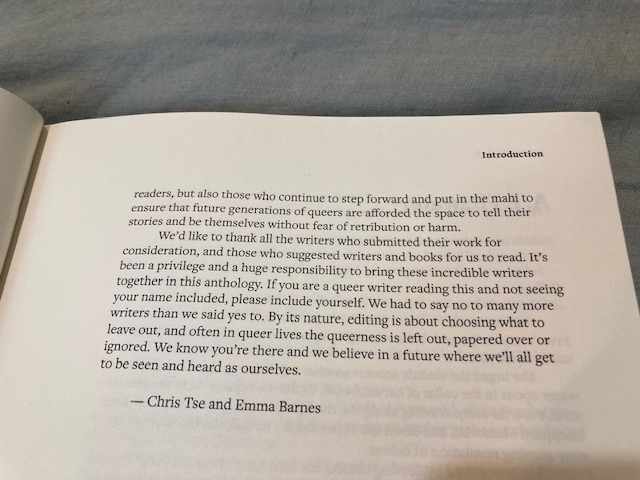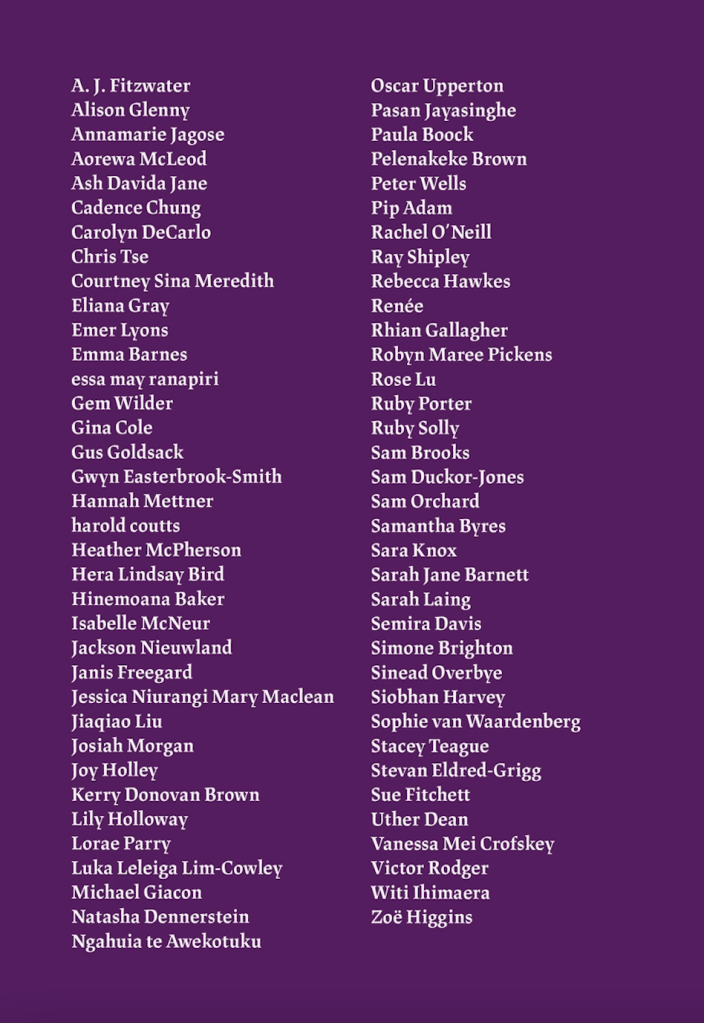Out Here: An anthology of Takatāpui and LGBTQIA+ writers from Aotearoa,
eds Chris Tse and Emma Barnes, Auckland University Press, 2021
Gender buttons
An object on a shelf; a self with words inside that never came out.
Your finger down my spine; fine singing in my bones. Umbrella avoiding
the rain: the celebrating hat you wear. Tell me a little more about myself.
The food you forgot; what you got for biting at my breasts. The coloured
loss of uneaten toast on the bench and your tongue of loving pepper.
Hunger heavy in my mouth.
This room we bed down in, be wed down in. White roses growing
on the ceiling.
You want in a variety of colours, but a rose is a rose is a rose
a bunch of them placate the air much better than one.
We couldn’t grow anywhere else.
The teasing is tender and trying and thoughtful. Melting without mending
you undo my gender buttons till all of me is myself.
Hannah Mettner
Out Here is a significant arrival in Aotearoa, both for the sake of Takatāpui and LGBTQIA+ writers and readers, and for the sake of poetry. The sumptuous and wide ranging anthology feeds heart mind skin lungs ears eyes. It is alive with shifting fluencies and frequencies, and I want to sing its praises from the rooftops, from the moon, from street corners.
Chris Tse and Emma Barnes have responded to the erasure of queer identities in a national literature that was traditionally dominated and controlled by white heterosexual men. Chris and Emma opted to use ‘Takatāpui’ and ‘LGBTQIA+’ in the title to signal Aotearoa’s rainbow communities within the broadest possible reach. They have used the word queer in their introduction and underline that that must make room for as many ‘labels and identities’ as necessary. I am using the word queer with similar intentions.
Having spent a number of years on a book that responded to the erasure of women in literature across centuries, I understand what a mammoth task it is to shine a light across invisible voices and to reclaim and celebrate. To refresh the reading page in vital ways. Out Here draws together prose and poetry, from a range of voices, across time, but it never claims to cover everything. We are offered a crucial and comprehensive starting point. After finding 110 writers, Emma and Chris sent out an open call, and the response was overwhelming.
We chose words that delighted us, surprised us, confronted us and engaged us. We chose political pieces and pieces that dreamed futures as yet only yet imagined. We chose coming out stories and stories of home. We followed our noses. What our reading revealed to us is that our queer writers are writing beyond the expectations of what queer writing can be, and doing it in a way that often pushes against the trends of mainstream literature.
Emma Barnes and Chris Tse
I am reading the poetry first. I am reading poetry that reactivates what poems can do whether in terms of style, voice, theme, motifs. Some poems are navigating sexuality, gender issues, sex, love, identity. Other poems explore the body, oceans, discomfort, the end of the world, mothers, fathers, violence, tenderness, place, the dirt under fingernails. Expect humour and expect seriousness, the personal and the imagined. Expect to be moved and to be heartened. Some of the poems are familiar to me, others not, and it is as though I have parked up in a cool cafe for a legendary poetry reading (if only!). The physicality is skin-pricking, the aural choices symphonic, the intimate moments divine.
Take the three poems of Ash Davida Jane for example. I am reminded of the feminist catchphrase the personal is political but I am upending it to become the political is personal. ‘Good people’ resembles an ode to the soy milk carton. The poem considers how to be in the world, to make good choices, and be a good person when the world is drowning in plastics. It blows my head off. Ash’s second poem, ‘water levels’, celebrates the tenderness of being in the bath with someone who is shampooing your hair. The poem slows to such an intimate degree I get goosebumps. A poem that looks like a paragraph, ‘In my memory it is always daytime’, pivots on the waywardness of memory, its omission coupled with its power to transmit. I keep stalling on this glorious suite of poems rereading, revelling in the ability of poetry to deepen my engagement with the world, language, my own obsessions, weakenesses.
I stall too on Carolyn DeCarlo’s poems like I have struck a turning bay in the anthology. Rereading revelling. Reading revelling. And then Jackson Nieuwland’s astonishing ‘I am a version of you from the future’ where they stand in the shifting shoes and choices of a past self and it is tender and it is moving and it is tough. Or Ruby Solly’s ‘Lessons I don’t want to teach my daughter’, which is also tender and moving and tough. The ending in both English and Te Teo Māori restorative.
Imagine me standing on my rooftop singing out the names of the poets in the anthology and how they all offer poems as turning bays because you cannot read once and move on, you simply must read again, and it is measured and slow, and the effects upon you gloriously multiple. Chris and Emma have lovingly collated an anthology that plays its part in the final sentence of their introduction:

The final sentence resonates on so many levels. No longer will we tolerate literature that is limited in its reach. Poetry resists paradigms set in concrete, fenced off manifestos, rules and regulations, identity straitjackets. I welcome every journal and event, website and publishing house, that opens its arms wide to who and how we are as writers and readers. Out Here makes it clear: we are many and we track multiple roads, we are familied and we are connected. We are loved and we are at risk. We are floundering and we are anchored. This is a book to toast with a dance on the beach entitled POETRY JOY. I am dancing with joy to have this book in the world. To celebrate its arrival, I invited nine contributors to record a poem or two. Listen here.
Thank you Emma, Chris and Auckland University Press; this book is a gift. 💜 🙏
I would like to gift a copy of this book to one reader. Let me know if you’d like to go in my draw.
The editors
Chris Tse (he/him) was born and raised in Lower Hutt. He studied English literature and film at Victoria University of Wellington, where he also completed an MA in creative writing at the International Institute of Modern Letters (IIML). Tse was one of three poets featured in AUP New Poets 4 (2011). His first collection How to be Dead in a Year of Snakes (2014) won the Jessie Mackay Award for Best First Book of Poetry and his second book He’s So MASC was published to critical acclaim in 2018.
Emma Barnes (Ngāti Pākehā, they/them) studied at the University of Canterbury and lives in Aro Valley, Wellington. Their poetry has been widely published for more than a decade in journals including Landfall, Turbine | Kapohau, Cordite and Best New Zealand Poems. They are the author of the poetry collection I Am in Bed with You (2021).
Auckland University Press page



Thanks for sharing this and the recordings. Such important work that needs to be shared, promoted, and supported.
LikeLike
Kia ora, I’d love to win a copy of this brave, new book.
Thank you, Marina Lathouraki
On Sun, Dec 12, 2021 at 11:26 AM NZ Poetry Shelf wrote:
> Paula Green posted: ” Out Here: An anthology of Takatāpui and LGBTQIA+ > writers from Aotearoa, eds Chris Tse and Emma Barnes, Auckland University > Press, 2021 Gender buttons An object on a shelf; a self with words inside > that never came out.Your finger down my” >
LikeLike
I will put yr name in the hat. Do you live in NZ?
LikeLike
Pingback: Poetry Shelf celebrates 2021: Fifteen authors make some picks | NZ Poetry Shelf